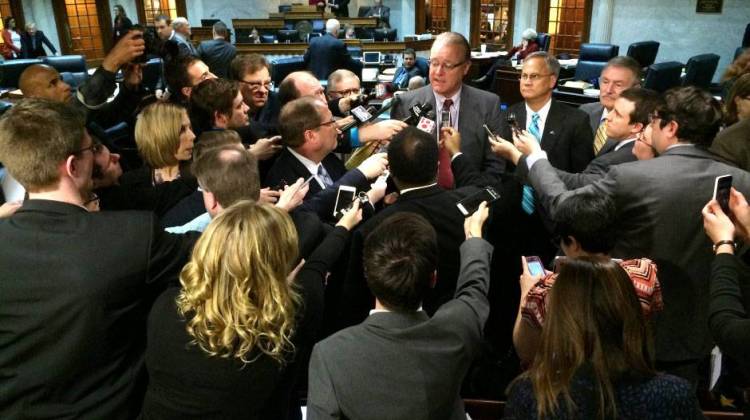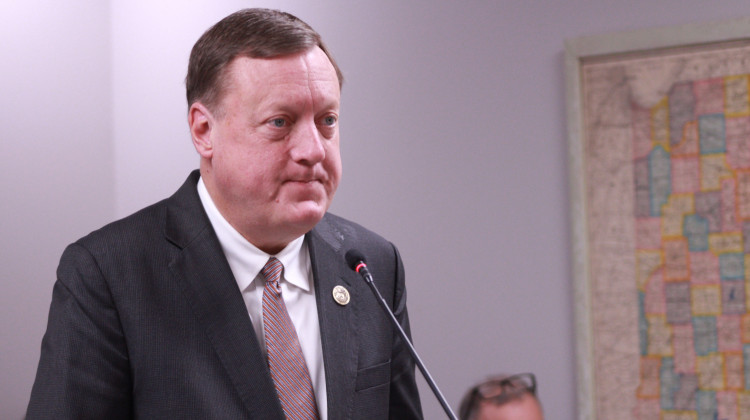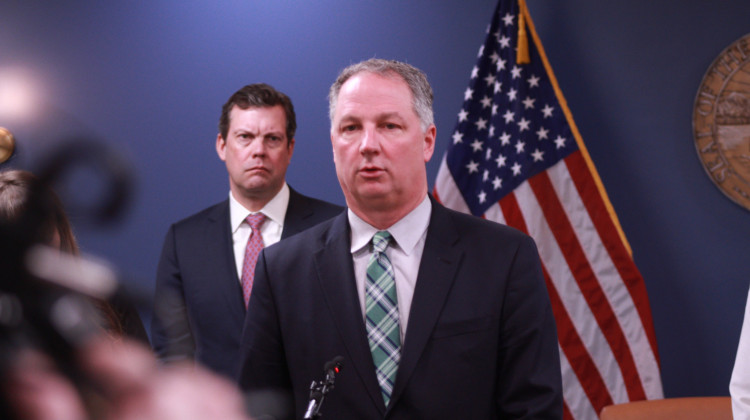
Senate President Pro Tem David Long, speaks to the media on the floor of Senate after it was announced the LGB rights bill would not receive a vote.
Drew DaudelinINDIANAPOLIS -- The abrupt death of legislation aimed at balancing religious freedom with gay, lesbian and bisexual civil rights left many surprised and disappointed. Fingers started pointing almost immediately as advocates in the debate sought to assign blame.
That finger-pointing could have a ripple effect on this year’s elections, as people on both sides of the issue begin looking ahead to the fall.
Immediately after Senate Republican leaders announced their LGBT bill wouldn’t advance, their talk shifted to the future. Senate President Pro Tem David Long said LGBT protections in Indiana are inevitable, and that the hours of testimony and discussion lawmakers heard this session represent significant progress toward that goal.
But progress isn’t enough for some.
“I think the time for inching forward is over. There was a really easy way, and there still remains, I should point out, a really easy way to solve this problem,” said Peter Hanscom of Indiana Competes, a non-partisan group representing 450 businesses around the state that support a non-discrimination bill.
He says while they thought the Senate bill had flaws, they wanted it to advance to at least keep the conversation going.
But American Family Association of Indiana executive director Micah Clark says that conversation is hurting Indiana’s reputation. He argues the problem it seeks to solve simply doesn’t exist.
“I mean, is there mistreatment of people? Sure. Everybody’s mistreated of all groups at some point, there’s bad people in the world," Clark said. "But is it worthy of a law that divides Indiana, and pits people against people, and hurts religious freedom? We don’t think so.”
The debate is one voters might weigh as they go to the polls later this year.
Freedom Indiana is an organization that’s been at the forefront of LGBT rights issues at the Statehouse the last few years. Its campaign manager Chris Paulsen says it’s a non-partisan group, which means it won’t target any specific candidates during election season.
“But I think definitely, we saw that 70 percent of Hoosiers think this should happen, so if lawmakers are listening to their constituents then I think it will have an effect in the elections,” Paulsen said.
Hanscom says the same, but notes many of the businesses aligned with Indiana Competes have their own political operations and make campaign donations.
Some on the other side are worried certain legislators could be targeted, but Clark brushes off the possibility. He says, for better or worse, that’s the way the process works.
Gov. Mike Pence, set to run for re-election against Democrat John Gregg, has been criticized for his hardline stance on the issue. Pence vowed in his State of the State address not to support any bill that diminishes religious freedom.
Former House Democratic Floor Leader and former Bloomington Mayor Mark Kruzan says it’s not just the governor’s stance, but the way he’s handled communicating that stance, that could cost him votes. He refered to Pence’s appearance on ABC’s “This Week” with George Stephanopoulos last year, where many say Pence blundered his defense of the state’s Religious Freedom Restoration Act — a controversy that ultimately led to the non-discrimination bill this year.
“When we have a governor who went on national television and ended up embarrassing the state of Indiana, to a point where it’s costing us our reputation but also costing us in our pocketbooks, that’s a problem,” Kruzan said.
Former Indiana Republican Party spokesman Pete Seat says this year’s debate didn’t have the same intensity RFRA sparked last session. He says he doesn’t think it’s going to drive elections this cycle.
“With this issue and practically any issue in the legislature, it’s up to the Republicans to figure it out," Seat said. "The Democrats at this point in time are irrelevant. They are super minorities in both chambers, and whatever the Republican caucuses in the House and Senate determine, that will effectively be the law.”
But Seat notes that doesn’t mean the fight for LGBT protections will go away. He says a cultural, generational divide between young and old lawmakers will simply take time, or a better-designed compromise, to reconcile.
“So you’re seeing this cultural shift, you’re seeing this dynamic that hasn’t necessarily taken hold here in Indiana to the extent that it has on the coasts, let’s say, but people are looking to it,” Seat said.
He said shifts like these take place over the course of months, years, and sometimes decades. Lawmakers say they’re getting there. But for some, Hanscom says, the bill is already past due.
“Words don’t fix this problem. Action is what fixes this problem," Hanscom said. "And for the hundreds of thousands of LGBT Hoosiers who can still be legally fired from their job, denied access to housing or kicked out of a public place the idea that we had a discussion about it means absolutely nothing to them.”
 DONATE
DONATE






 Support WFYI. We can't do it without you.
Support WFYI. We can't do it without you.